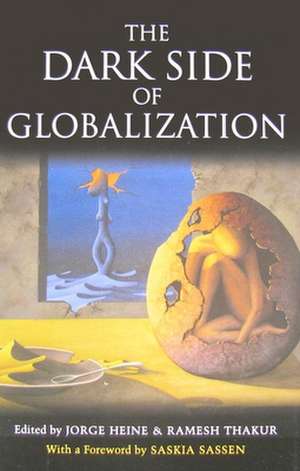The Dark Side of Globalization
Editat de Jorge Heine, Ramesh Thakuren Limba Engleză Paperback – 24 ian 2011
Seen by some as a desirable and irreversible engine of prosperity and progress, globalization is resisted by others as the soft underbelly of a corporate imperialism that plunders and profiteers in the global marketplace. Globalization has brought many benefits, including the reduction of poverty in several countries. But it also has a dark side: the unleashing of negative forces as a result of the compression of time and space made possible by modern technology. Examples include the transnational flows of terrorism, drug and human trafficking, organized crime, money laundering, and global pandemics.
How do these various expressions of "uncivil society" manifest themselves? How do they exploit the opportunities offered by globalization? How can governments, international organizations, and civil society deal with the problem?
From arms trafficking in West Africa through armed insurgencies in South Asia and the upsurge of jihad in the age of globalization, this book examines the challenges that the dark forces of globalization pose to the international system and the responses they have triggered. Written largely by authors from developing countries, the book's goal is to help maximize the beneficial consequences of globalization while muting its baleful effects.
How do these various expressions of "uncivil society" manifest themselves? How do they exploit the opportunities offered by globalization? How can governments, international organizations, and civil society deal with the problem?
From arms trafficking in West Africa through armed insurgencies in South Asia and the upsurge of jihad in the age of globalization, this book examines the challenges that the dark forces of globalization pose to the international system and the responses they have triggered. Written largely by authors from developing countries, the book's goal is to help maximize the beneficial consequences of globalization while muting its baleful effects.
Preț: 289.65 lei
Nou
Puncte Express: 434
Preț estimativ în valută:
55.42€ • 57.87$ • 45.87£
55.42€ • 57.87$ • 45.87£
Carte tipărită la comandă
Livrare economică 04-18 aprilie
Preluare comenzi: 021 569.72.76
Specificații
ISBN-13: 9789280811940
ISBN-10: 9280811940
Pagini: 300
Dimensiuni: 152 x 229 x 20 mm
Greutate: 0.48 kg
Editura: Brookings Institution Press
Colecția United Nations University Press
ISBN-10: 9280811940
Pagini: 300
Dimensiuni: 152 x 229 x 20 mm
Greutate: 0.48 kg
Editura: Brookings Institution Press
Colecția United Nations University Press
Notă biografică
Jorge Heine is a distinguished fellow at the Centre for International Governance Innovation (CIGI) and a CIGI Chair in International Governance cross-appointed to Wilfrid Laurier University.
Ramesh Thakur is the inaugural director of the Balsillie School of International Affairs, a distinguished fellow at CIGI, and professor of political science at the University of Waterloo, Canada.
Ramesh Thakur is the inaugural director of the Balsillie School of International Affairs, a distinguished fellow at CIGI, and professor of political science at the University of Waterloo, Canada.
Descriere
Seen by some as a desirable and irreversible engine of prosperity and progress, globalization is resisted by others as the soft underbelly of a corporate imperialism that plunders and profiteers in the global marketplace. Globalization has brought many benefits, including the reduction of poverty in several countries. But it also has a dark side: the unleashing of negative forces as a result of the compression of time and space made possible by modern technology. Examples include the transnational flows of terrorism, drug and human trafficking, organized crime, money laundering, and global pandemics.
How do these various expressions of "uncivil society" manifest themselves? How do they exploit the opportunities offered by globalization? How can governments, international organizations, and civil society deal with the problem?
From arms trafficking in West Africa through armed insurgencies in South Asia and the upsurge of jihad in the age of globalization, this book examines the challenges that the dark forces of globalization pose to the international system and the responses they have triggered. Written largely by authors from developing countries, the book's goal is to help maximize the beneficial consequences of globalization while muting its baleful effects.
How do these various expressions of "uncivil society" manifest themselves? How do they exploit the opportunities offered by globalization? How can governments, international organizations, and civil society deal with the problem?
From arms trafficking in West Africa through armed insurgencies in South Asia and the upsurge of jihad in the age of globalization, this book examines the challenges that the dark forces of globalization pose to the international system and the responses they have triggered. Written largely by authors from developing countries, the book's goal is to help maximize the beneficial consequences of globalization while muting its baleful effects.
